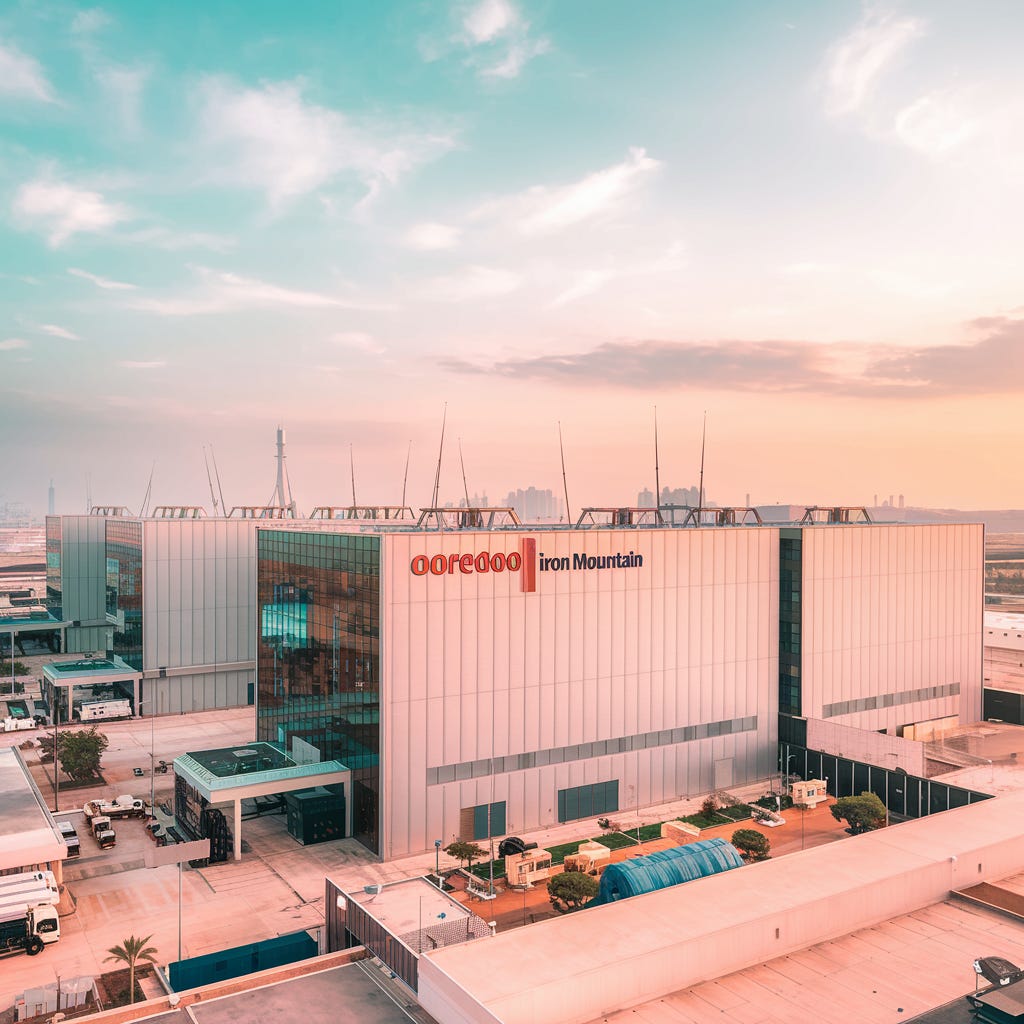Ooredoo and Iron Mountain’s $1 Billion Bet on MENA’s Digital Future
The race to dominate the next frontier of digital infrastructure is heating up—and the Middle East and North Africa (MENA) region is quickly emerging as a critical battleground.
In a game-changing move, Ooredoo and Iron Mountain have announced a $1 billion partnership to accelerate data center expansion across MENA.
This strategic alliance not only underscores the region’s growing importance as a hyperscale and AI-ready hub but also sets the stage for a transformative shift in cloud adoption and digital services.
But what makes this deal different from the billions already being invested in MENA’s data center market?
And what does it signal about the future of the region’s AI and cloud infrastructure?
Let’s break it down.
A Strategic Move with Global Implications
Ooredoo’s MENA Digital Hub—which already operates 26 data centers across Qatar, Kuwait, Oman, Iraq, and Tunisia—will serve as the vehicle for this massive expansion.
With Iron Mountain acquiring a minority stake, this partnership brings together:
✅ Ooredoo’s deep regional expertise in telecom and data center operations
✅ Iron Mountain’s global operating experience, covering 415 MW of active capacity and 1.3 GW in its development pipeline
✅ A $1 billion investment roadmap, scaling MENA Digital Hub’s capacity beyond 120 megawatts
For Iron Mountain, this marks a strategic entry into the MENA data center market, which has traditionally been dominated by regional players like Khazna Data Centers, Gulf Data Hub, and Saudi Telecom Company.
By backing Ooredoo, Iron Mountain is positioning itself to capitalize on the region’s AI-driven demand while leveraging its expertise in hyperscale, colocation, and enterprise cloud solutions.
Meanwhile, Ooredoo benefits from Iron Mountain’s design, construction, and operational guidance, ensuring that its facilities meet the rigorous demands of hyperscalers, enterprises, and AI workloads.
Why This Deal Stands Out in a Crowded Market
The MENA region has been attracting massive digital infrastructure investments. Consider some of the major deals in the past two years:
🔹 AWS’s $5.3 billion investment in Saudi Arabia—a major push to expand cloud and AI services
🔹 Microsoft’s $1.5 billion partnership with G42 in the UAE, boosting the region’s AI and cybersecurity capabilities
🔹 KKR’s $5 billion investment in Gulf Data Hub, expanding hyperscale and colocation services
While these investments focus on specific markets like Saudi Arabia and the UAE, Ooredoo and Iron Mountain’s multi-market strategy makes their approach unique.
Instead of concentrating all efforts on one country, they’re scaling across multiple MENA economies, creating a distributed, AI-ready infrastructure network.
Another key differentiator? Carrier neutrality.
Unlike telco-owned facilities that prioritize in-house traffic, MENA Digital Hub is positioning itself as an independent data center platform that serves a variety of hyperscalers and enterprises, ensuring greater flexibility and competitive pricing.
MENA’s Data Center Boom: What’s Driving This Growth?
The urgency to expand digital infrastructure in MENA is being driven by several key trends:
📈 AI and Cloud Adoption: With AI models becoming increasingly compute-intensive, hyperscalers and enterprises are scrambling to secure high-power-density facilities that can support AI workloads.
⚡ Competitive Power Costs: MENA’s electricity prices are 40-60% lower than those in Europe, making it a prime location for energy-intensive AI and hyperscale data centers.
🏛 Government Backing: Digital transformation initiatives like Saudi Vision 2030 and Qatar National Vision 2030 are accelerating investments in local cloud computing, AI development, and regulatory support for data center growth.
🛡 Data Sovereignty & Localization: Governments across the region are tightening regulations around data residency, forcing hyperscalers to host data locally instead of relying on European or Asian hubs.
These factors are collectively pushing the region toward a data center investment boom, and partnerships like Ooredoo-Iron Mountain will play a pivotal role in shaping this future.
The Future: AI-Optimized Infrastructure & Sustainability
As the competition for AI-ready capacity heats up, we can expect future investments to focus on:
🌱 Sustainability & Renewable Energy: With MENA’s water scarcity concerns, liquid cooling, waste heat recycling, and solar-powered data centers will become key differentiators in the market.
🔗 Hybrid & Multi-Cloud Solutions: Enterprises will increasingly demand multi-cloud and hybrid solutions, requiring greater interconnectivity between regional data centers and global cloud providers.
🤖 AI-as-a-Service (AIaaS): Hyperscalers will continue developing AI-specific cloud offerings, further increasing demand for high-performance computing infrastructure in MENA.
With its $1 billion investment plan, Ooredoo is making a bold bet that it can capture this demand while competing with global hyperscalers. The addition of Iron Mountain’s expertise only strengthens its position as a leading player in the region.
Final Thoughts: A Defining Moment for MENA’s Data Center Market
The Ooredoo-Iron Mountain partnership isn’t just another investment—it’s a signal that global players are doubling down on MENA’s data infrastructure.
The question now is:
💡 Will MENA emerge as the next global data center powerhouse?
With rising hyperscale demand, aggressive government incentives, and some of the world’s most competitive power costs, the answer is increasingly looking like yes.
As this partnership unfolds, it will be fascinating to watch how MENA Digital Hub competes with established players and whether it can carve out a unique niche in the AI-driven data center economy.
What’s your take?
Will MENA become a dominant player in the AI data center race?

